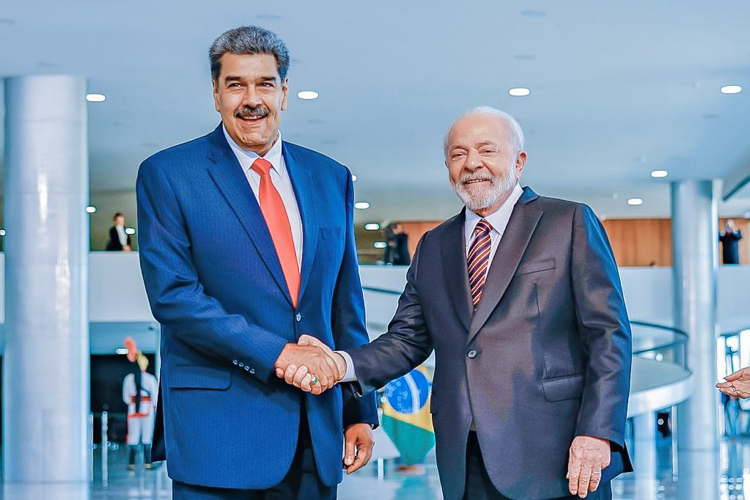Tim Young, Venezuela Solidarity Campaign, writes on Venezuelan President Maduro and Brazilian President Lula’s meeting to re-establish relations and promote regional integration.
Brazil’s former President, far-right politician Jair Bolsonaro, had throughout his term constantly attacked Venezuela’s elected President Nicolas Maduro and promised to “do whatever is possible” to depose him.
Bolsonaro’s sentiments echoed the United States’ ongoing campaign to isolate Venezuela and vilify its leaders as part of the US’s regime change agenda.
But the welcome given to Maduro by newly elected Brazilian President Lula da Silva marked a sea-change in relations when they met the day before the recent Summit of South American Presidents held in Brasilia a week ago.
Maduro’s meeting with Lula represented a major step to strengthen bilateral ties following the early restoration of diplomatic and economic relations under Lula’s presidency. Discussion focused on regional and international cooperation, as well as Venezuela’s potential membership of the BRICS bloc, which consists of Brazil, Russia, India, China, and South Africa.
As the foremost geopolitical rival to the G7 bloc of leading advanced economies, BRICS and its New Development Bank, now headed by former Brazilian President Dilma Rousseff, represent a challenge to the dominance of the US dollar in international trade, which underpins the US’s wide-ranging illegal sanctions regime. Entry to BRICS would a major step for Venezuela, in line with Chávez’s and Maduro’s desire to build alternative, counterweight blocs to US hegemony.
At a regional level, the Summit of South American Presidents also saw new steps taken towards integration. Lula’s theme in hosting the meeting was that a united South America was now needed to overcome past divisions. Describing the summit as “taking the first steps to resume our dialogue,” he called for a process of economic, cultural, and social integration between the countries, using UNASUR, an intergovernmental regional organization set up by Chávez in 2008, as a vehicle for doing so.
A key aim of UNASUR had been to counter US influence in the region, but over time its influence and strength had waned. In 2018, six countries’ right-wing leaders opposed to the integration agenda had suspended their membership, in a move widely seen as a US initiative to thwart the developing cooperation.
President Maduro welcomed Lula’s proposal, as did others, with President Alberto Fernández of Argentina declaring: “Let us learn from our mistakes. It did not help us to be divided. Let us make the operation of UNASUR more agile and be the architects of our destiny.”
President Fernandez was one of four leaders that President Maduro held bilateral meetings with, to consolidate cooperation and integration. With President Petro of Colombia, President Maduro signed an Agreement for the Creation of the Neighbourhood and Integration Commission, to coordinate cooperation in border areas and promote business collaboration to strengthen bilateral production. Maduro also met with President Arce of Bolivia, with whom he had earlier signed 13 cooperation agreements, and signed further agreements with President Lula.
All told, Maduro’s participation at the Summit marked a significant and positive turning point in Venezuela’s international relations with the South American continent. While Maduro has long counted on the support of Bolivia, under Presidents Morales and Arce, the victories of President Petro in Colombia and President Lula in Brazil have added to his allies and helped to provide a platform for increased participation and recognition in regional politics and beyond.
As Lula put it, “this marks the beginning of Maduro’s return” to the international arena. But disapproving voices remain. Earlier Lula had noted the condemnation in some quarters of Venezuela and advised Maduro: “Venezuela must showcase its narrative, so that it can effectively make people change their minds… You [Maduro] need to build your narrative. And your narrative will be infinitely better than what they have been telling about you.”
“It is in your hands to build your narrative and turn this game around,” Lula reiterated, “so that… Venezuela returns to being a sovereign country, where only its people, through a free vote, can say who will govern that country.” These comments sparked criticism from a few of the summit countries’ leaders. The far-right leader of Uruguay, President Lacalle, tartly responded: “I must say that I was surprised when [Lula] said that what is happening in Venezuela is a narrative. We already know what we think of Venezuela and the Venezuelan government.”
Lula nonetheless rejected Lacalle’s views, with Lula explaining that he had seen how a narrative demonising Hugo Chávez had been built up and recounted his own experience too during and after his first terms as President, saying “it happened with Chávez, and that’s how it happened with me.”
These developments mark both a blow to US domination in Latin America and an opportunity to up our campaigning internationally in support of self-determination, social progress and integration in the region.
This article originally appeared on Labour Outlook

